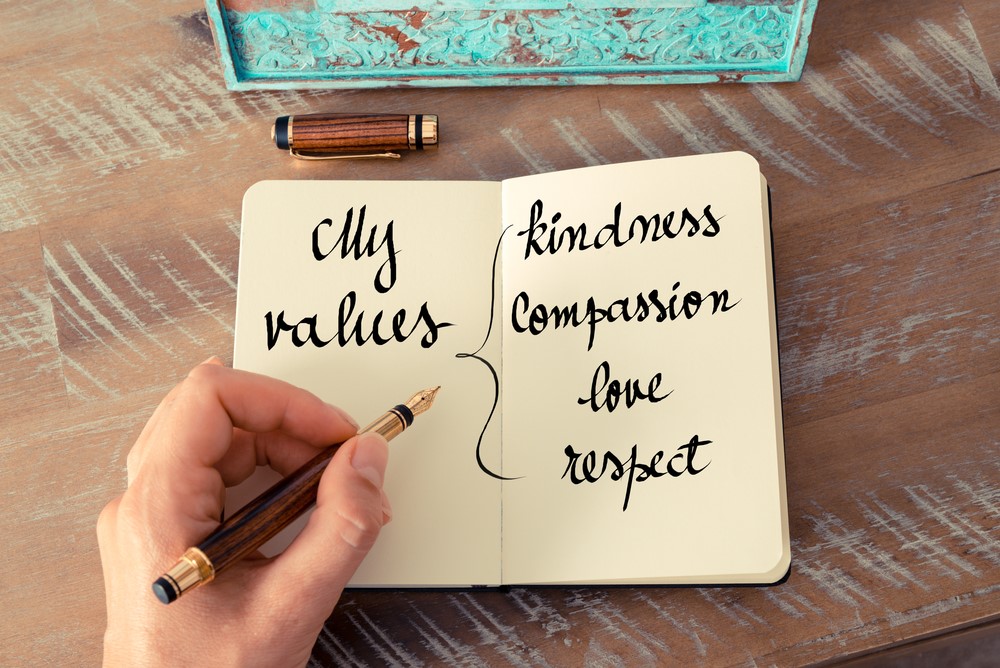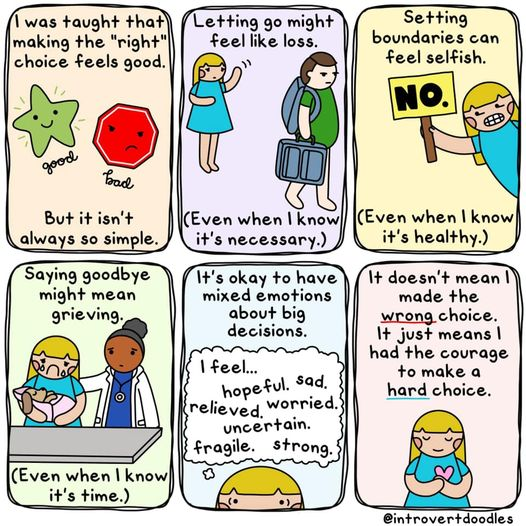
Caregiving sometimes feels like a minefield. There are countless decisions for you to make most days, including how and when to prioritize your own needs, and how to best support your loved one. In this environment, making good caregiving decisions might feel overwhelmingly difficult.
You might also be faced with conflicts between ideas of what you should do (or feel like you should do) versus what’s actually practical in the situation.
To make matters worse, many caregivers have little preparation and no training. So, how do you do it? How do you make the right decision for everyone involved?
Making Good Caregiving Decisions
There are plenty of common and familiar strategies for making good caregiving decisions, like looking for advice, not letting your emotions rule you, and thinking through alternatives. We’ll highlight some of these at the end of the post, but they’re not our focus today.
Another option is the Capacity Framework model, which I highlighted in an earlier post. This framework offers a way to think about your needs and those of the care recipient in a more balanced manner. It can help you to learn when to take care of yourself and how to do so well.
The Capacity Framework can be incredibly useful, but it doesn’t answer every challenge.
What about the tough calls and large decisions, like…
- Should you keep your parent living with you or send them to assisted living?
- Do you cut a toxic parent out of your life when they need your help?
- Should you confront the person you’re supporting about their toxic behavior?
- What do you do if caregiving is destroying your relationship?
- When should you set boundaries with a manipulative older parent (and what do you do if they ignore those boundaries)?
- Is it okay to stop being a caregiver?
- Are you selfish for not wanting to support your parent?
- How much of your own physical, mental, and financial wellbeing should you compromise to support a family member?
These aren’t easy questions. Part of the problem is that there’s no correct solution.
Instead, you need to work out what’s the best approach for you and your situation.
Understanding your values is a powerful way to do just this. In an earlier post, we talked about how you can identify your personal values. Today, we’re interested in how they can help you with decision-making.
What Are Values?

Let’s start right at the beginning.
Values are, quite simply, the things that matter to you. They’re the core ideas that help to define who you are and where you stand. They’re incredibly important, as a life that follows your values feels very different from one that does not.
Your values can also act as a type of compass or loadstone for decision-making, helping you to decide clearly what to do and when.
While we all have values, most of us haven’t taken a close look at them and don’t know which ones are the most important to us.
Some examples of values include the following:
- Respect
- Adventure
- Affection
- Focus
- Productivity
- Growth
- Happiness
- Friendship
- Ambition
- Authenticity
You can see more examples in our post on finding personal values, as I listed more than 100 different values in that piece.
Finding Your Values
If you’re going to use values to guide good caregiving decisions, then you need a short list of your most important values and what they mean to you.
For example, the list below are my key values, which I found through the steps in this post.
- Love/Connection (belonging, connection, love, loyalty, family).
- Authenticity (honesty, sensitivity, curiosity, grace,).
- Kindness/Compassion (compassion, grace, forgiveness, sensitivity, understanding, kindness).
- Contribution/Direction (meaningful work, personal growth, contribution, purpose).
- Strength/Grit (resilience, strength, flexibility, pragmatism).
To be satisfied, to do well, you need to be living a life that aligns with your values.
Now, I’m lucky in that my values naturally align with caregiving.
Still, when I was a caregiver, I did need to work on the contribution/direction area, as my caregiving situation was very repetitive and I needed some aspect of my life that had a sense of growth over time (I settled on a combination of blogging and creative writing).
How Your Values Relate To Your Decisions
So then, how do you use values to make decisions?
Well… the idea is that your values show what’s important to you. They highlight what you need to have a fulfilling life.
Ideally, the decisions that you make need to align with your values. Or, if they don’t, then you need to find other ways to meet those values.
Clear as mud?
Let me give you an example.
For me personally, love, connection, and authenticity are incredibly high values. They always have been. It matters a lot to me that people are authentic to themselves, even if doing so is sometimes difficult for me.
I’m also a planner. I like the day having structure, especially when I have a lot to juggle.
However, being a planner is a practical thing, while authenticity is a value. So, if I’m dealing with someone naturally impulsive, I’ll tend to find ways to enjoy them as they are, rather than insisting that they plan more.
Here’s another example, from a caregiving perspective.
Ada is trying to decide whether to move her aging mother in with her and her husband, or to look at alternative options (like a senior apartment or perhaps assisted living).
Moving her mother in seems like the ‘right’ thing to do.
Ada feels like she’d be a bad daughter if she didn’t. There’s certainly a social expectation that she moves her mother in.
Yet, independence is a strong value for Ada, as is predictability. Having a stable home environment is incredibly important to her, particularly at the end of a working day.
Having her mother living with her would change that entirely.
In this situation, moving her mother into a senior apartment might be a much better approach. Ada could still support her mother by visiting regularly and helping with bills, and she could do so without feeling resentful.
Many caregivers like Ada unintentionally put themselves in awful situations because they’re not aware of what matters the most to them.
Identifying your values, then using them as a guide, can help you to avoid serious missteps.
Do You Always Need to Follow Your Values?
Following your values can make huge differences in your life, giving you a stronger sense of purpose and stability.
However, you may need to make compromises or choose one value over another.
Consider Ada from the previous example. She might end up in a situation where her options are more limited, where the only way to take care of her mother is to have her living with Ada.
If this is the case, Ada might choose to do so, even though it clashes with her value for independence and predictability.
The trick, then, is for Ada to find ways to still meet that value in her life.
For example, she might set things up so that there’s one room that’s only hers. No one else uses it. Or, perhaps a corner of a room, if space is limited. That place becomes her refuge, where she goes to re-center and to cope with the world around her.
The more you know about your values, the easier it is to account for them in your life and decisions.
Other Tools to Help You Make Good Caregiving Decisions

Understanding your values and applying them to your situation is a critical part of good decision-making – one that’s often missed.
However, as you’re doubtlessly aware, values aren’t the only part of the equation.
There are some other areas to talk about as well.
Take a Step Back
The first thing is to pause.
Take a step back practically and energetically, and really think about the decision at hand. Doing so is critical, as it stops you from making a rash decision.
This is why thinking of things ahead of time is helpful, as it gives you the time and space that you need to plan well.
If time is pressing, consider the ACE formula that Dr. Russ Harris talks about in When Life Hits Hard (also called The Reality Slap). ACE stands for Acknowledge, Connect, and Engage.
Specifically, the goal is to acknowledge what you’re feeling without judgment, connect with your body, then engage with the activity at hand. In this case, you’d be engaging with the decision.
This approach can be powerful in crisis, giving you the chance to acknowledge the depth of what you feel in the moment (which may involve practicing self-compassion) and then come back to what’s happening and the decision that needs to be made.
Think and Talk Through the Options
While this might seem obvious, it’s crucial to take the time and seriously think through the decision and the different paths you can take.
Try being curious here, as it’s too easy to get stuck in a set view of what the solution should look like. Staying curious can help you to explore and entertain different solutions, including some you might have rejected outright to begin with.
When you’re looking at the options, try focusing on the problems you’re trying to solve – rather than the solution that you think will help.
Take the idea of moving your aging parent into your house.
Rather than looking at how you can convince them, first think about why you want them there. If safety is the main concern, what other ways can you help to keep them safe?
Getting the senior involved in decision-making helps too. After all, what you’re thinking about and planning is going to affect them.
It’s often helpful to talk about what they want and also why. For example, what makes them want to stay in their own home?
You can then start to look for ways to meet their wants, as best as is possible, while still protecting them.
Look for Advice
Advice is important too.
Other people can often show you blind spots in your own thinking. They might even present alternative solutions or help you to be more compassionate.
The trick, however, is to filter any advice through your own values and knowledge of the situation. Doing so is crucial for caregivers, as no one on the outside knows your situation quite like you do.
Friends and family members will often have idealistic views about how things should be. For example, many caregivers find that family members say ‘you should be kinder’ or ‘you should do more’, when in practice the caregiver needs more time for themselves and might need to set firm boundaries with the senior.
Patterns like this aren’t surprising, as most people have no sense of the caregiving experience until they have been one themselves.
Listen to Your Emotions, But Don’t Be Ruled by Them
Emotions can be helpful to help you make good caregiving decisions. A sense of anxiety about a parent moving in with you, for example, might be a sign that you need to think things through more carefully.
However, we often put too much stock in emotions.
It’s easy to assume that what we feel is accurate and that the right decision should feel right. Yet, as the image below highlights, sometimes the healthiest decisions are overwhelmingly difficult. They push all kinds of buttons in you emotionally and it’s tempting to run away from them entirely (like choosing to place your aging parent in assisted living or saying no to an overly needy parent).

Remember that, while emotions have their uses, they’re strongly in the moment and are often survival focused. When thinking about what needs to be done, you often need to go far beyond the moment.
Looking at your values first makes it easier to interpret your emotional reactions and work out which ones should influence your decision and which ones are arising for other reasons.
Remember That You Won’t Always Get It Right
We all make bad decisions.
That’s part of being human. Sometimes we do so because we’re emotional or because we don’t think something through enough. Other times we simply make a bad call.
It doesn’t matter how much energy and effort you put into getting it right, sometimes you just won’t. And, that’s okay. There’s nothing wrong with being human and you can’t get out of that by putting more effort in.
Remember too that there often isn’t a right answer.
Think about living arrangements as an example. It might be starting to become unsafe for your aging parent to remain living alone in their home, but they don’t want to leave, as they feel connected to the place.
There are many options here, including trying to get them into assisted living, have them move in with you, move in with them, or find paid help to keep them safely at home for longer.
Every single option has its pros and cons. Any of them could go exceptionally well or be absolutely awful.
You can’t know ahead of time how things will pan out. All you can do is make the best decision possible based on your values and the situation.
Final Thoughts
Values aren’t the only tool in your decision-making kitbag. Taking a step back, looking for advice, listening to your emotions, and taking stock of your capacity are all important as well.
Still, values are particularly important because they’re overlooked so much of the time.
It’s easy to get so focused on social expectations of what you should do that you don’t energetically check in to see what you need.
And, let me be crystal clear here.
What you need really is important.
Caregivers often suffer from immense guilt, thinking that they should always put their family member first, but that’s not reasonable or healthy. For your sake and for theirs, you need to value yourself.

Leave a Reply